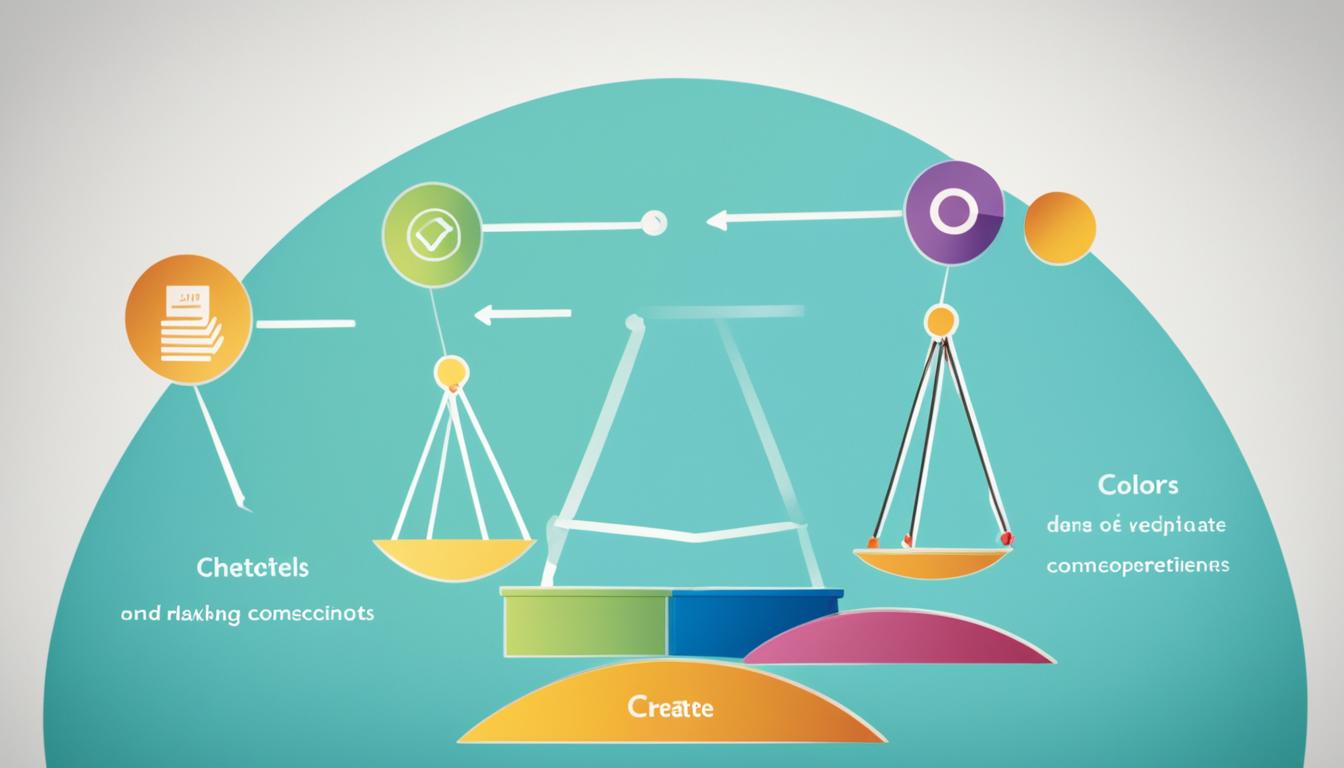When facing complex moral dilemmas, it is crucial to have a structured approach to guide our decision-making. The ethical decision-making process offers a framework that enables individuals to navigate these challenges with integrity and clarity. By understanding and applying this process, we can make thoughtful choices that align with our core values and principles.
In this section, we will explore the steps and strategies involved in the ethical decision-making process. We will discuss the importance of aligning our actions with our core values and principles to make sound ethical decisions. Through this exploration, we aim to enhance our ability to navigate ethical dilemmas with confidence and integrity.
Understanding Ethical Dilemmas
In the realm of ethical decision-making, individuals often encounter complex ethical dilemmas that require careful consideration and navigation. These ethical dilemmas represent situations where individuals are torn between conflicting moral values and choices. Understanding ethical dilemmas is crucial as it provides insights into the challenges individuals face and the conflicts that arise during the decision-making process.
There are various types of ethical dilemmas, each presenting its own unique set of challenges. Some ethical dilemmas involve balancing the interests of different stakeholders, while others require individuals to choose between their personal beliefs and the expectations of society or their professional obligations. These dilemmas arise due to conflicting values, principles, and moral obligations, making the decision-making process difficult and often ethically ambiguous.
The Complexity of Ethical Dilemmas
The complexity of ethical dilemmas stems from a multitude of factors. Firstly, ethical dilemmas often involve conflicting moral principles, such as honesty versus loyalty or individual rights versus societal welfare. This clash of values makes it challenging for individuals to determine the best course of action.
Secondly, ethical dilemmas often arise in situations where there is no clear right or wrong answer. Individuals must consider multiple perspectives and potential outcomes, weighing the moral implications of each choice. This uncertainty adds to the complexity of ethical dilemmas.
Furthermore, ethical dilemmas can also result in moral conflicts within individuals, as they must reconcile their own beliefs and values with the ethical choices they are faced with making. This internal struggle can cause significant emotional distress and moral discomfort.
In order to navigate ethical dilemmas effectively, individuals must develop the necessary skills and strategies to address conflicting moral values and make ethical decisions. By understanding the intricacies of ethical dilemmas and the challenges they present, individuals can approach the decision-making process with clarity, wisdom, and integrity.
Steps in the Ethical Decision-Making Process
When faced with ethical dilemmas, it is crucial to follow a systematic approach to ensure that our decisions align with our values and principles. In this section, we will explore the step-by-step process involved in making ethical decisions.
Introducing the Decision-Making Framework
To navigate the ethical decision-making process effectively, it is helpful to have a decision-making framework in place. This framework serves as a guide through each stage of the decision-making process, ensuring that ethical considerations are thoroughly evaluated.
The decision-making framework starts with a clear understanding of the ethical issue at hand. It requires individuals to gather relevant information, identify the stakeholders involved, and define the problem in ethical terms.
The Importance of Ethical Analysis

One crucial step in the ethical decision-making process is ethical analysis. Ethical analysis involves evaluating potential courses of action based on ethical principles, moral theories, and societal expectations.
During the ethical analysis phase, individuals must consider the ethical implications and potential consequences of each possible decision. They evaluate the alignment between their choices and core values, as well as the impact on stakeholders and the broader community.
By conducting ethical analysis, individuals can make more informed and thoughtful decisions that prioritize ethical considerations.
In the next section, we will discuss the importance of aligning our actions with our core values and principles to ensure ethical behavior.
Aligning Actions with Core Values and Principles
When faced with ethical dilemmas, it is crucial to align our actions with our core values and principles. Making principles-driven decisions is key to maintaining ethical behavior and upholding our moral compass. By staying true to our values, we ensure that our actions promote integrity, fairness, and respect.
Core values serve as the foundation of our ethical decision-making process. They guide us in determining what is right and wrong, and influence our behavior in various situations. When our actions are in line with our values, we can be confident that we are making choices that are consistent with our personal and professional beliefs.
However, aligning our actions with our values can be challenging. It requires self-reflection, self-awareness, and a deep understanding of our values and their implications. It also requires the courage to make difficult decisions that prioritize ethical considerations over personal gain or convenience.
To ensure that our actions remain consistent with our values and principles, it is important to develop strategies that help us navigate ethical dilemmas effectively. This may involve seeking advice from trusted mentors or seeking input from individuals with diverse perspectives. By engaging in ethical discussions and considering different viewpoints, we can make more informed decisions that reflect our core values.
Additionally, regularly reviewing and reassessing our values is essential. As we grow and evolve, our values may change or become more refined. It is important to adapt our actions accordingly, so they continue to align with our updated principles. By continuously evaluating our actions, we can ensure that we are living in congruence with our core values and principles.
By aligning our actions with our core values and making principles-driven decisions, we can navigate ethical dilemmas with integrity and contribute to a culture of ethical behavior. In the next section, we will discuss practical strategies for effectively managing ethical dilemmas and resolving conflicts that may arise.
Strategies for Managing Ethical Dilemmas
In the complex landscape of ethical decision-making, it is crucial to equip ourselves with effective strategies for managing ethical dilemmas. By incorporating techniques that prioritize ethical considerations and foster conflict resolution, we can navigate these challenging situations with integrity and make informed choices.
1. Analyzing Ethical Choices: When faced with an ethical dilemma, it is essential to thoroughly analyze the available choices. By assessing the potential consequences, considering alternative perspectives, and evaluating the alignment with core values and principles, we can gain clarity and make ethical decisions that minimize harm and promote ethical behavior.
2. Resolving Conflicts: Ethical dilemmas often involve conflicting interests or values. To effectively resolve these conflicts, open and respectful communication is key. By engaging in constructive conversations, actively listening to all parties involved, and seeking common ground, we can work towards finding solutions that align with ethical principles and meet the needs of stakeholders.
3. Prioritizing Ethical Considerations: Ethical decision-making involves giving due consideration to ethical values and principles. It is important to prioritize ethical considerations over personal gain or short-term outcomes. By placing ethics at the forefront of the decision-making process, we can uphold integrity and ensure the long-term ethical sustainability of our choices.
4. Communication and Collaboration: Navigating ethical challenges often requires collaboration and cooperation. By fostering an environment of open communication, where diverse perspectives are valued and respected, we can collectively work towards ethical resolutions. Engaging in dialogue with colleagues, superiors, and stakeholders allows us to gain insights, build consensus, and make ethical decisions that consider different viewpoints.
5. Ethical Frameworks and Tools: Utilizing ethical frameworks and decision-making tools can provide structure and guidance in managing ethical dilemmas. These frameworks, such as the utilitarian approach, deontological ethics, and virtue ethics, offer a systematic way to evaluate choices and their ethical implications. By employing these tools, we can navigate ethical dilemmas with clarity and consistency.
To complement these strategies, effective ethical conflicts resolution often requires ongoing self-reflection, continual learning, and an understanding of the complexities inherent in ethical decision-making. By constantly honing our ethical decision-making skills, we can develop a strong ethical compass and ensure that our choices align with our core values and principles.

Case Study: Resolving Conflicting Business Ethics
In a recent case involving a financial institution, conflicting business ethics emerged when the company faced pressure to prioritize profits over ethical responsibilities. Through applying effective ethical decision-making strategies, the company’s leadership engaged in open dialogues with stakeholders, analyzed potential consequences, and resolved conflicts by aligning actions with core ethical values. This approach not only upheld ethical integrity but also resulted in long-term sustainability and trust in the organization.
Implementing Ethical Decisions in Practice
In practical settings, the implementation of ethical decisions plays a crucial role in upholding ethical behavior and ensuring ethical decision-making outcomes. It involves effectively incorporating ethical considerations into our actions and interactions to promote integrity and ethical integrity. By integrating our ethical choices into our daily practices, we create a positive impact on ourselves, our organizations, and our communities.
When implementing ethical decisions, it is important to be mindful of their potential outcomes. Ethical decision-making outcomes are not only influenced by the decision itself but also by how it is carried out. By consciously aligning our actions with our ethical choices, we create a foundation for positive ethical behavior implementation.
Monitoring and adjusting our decisions are also critical steps in the implementation process. Regularly evaluating the ethical integrity of our actions and interactions allows us to maintain alignment with our core values and principles. By being responsive to changing circumstances and contexts, we can adapt our decisions to uphold ethical standards.
Enhancing Ethical Decision-Making Skills
In order to make sound ethical choices, it is crucial to enhance our ethical decision-making skills. This section will explore the importance of ethical reasoning and critical thinking in the decision-making process. By developing these skills, individuals can improve their ability to navigate ethical dilemmas effectively.
Ethical reasoning plays a vital role in evaluating potential courses of action and considering the ethical implications of each choice. It involves applying ethical principles and values to assess the moral consequences and make informed decisions. By honing our ethical reasoning skills, we can better understand the ethical implications of our actions and make choices that align with our values.
Critical thinking is another key component of effective ethical decision-making. It involves analyzing and evaluating different perspectives and alternatives objectively. Through critical thinking, individuals can identify potential biases, evaluate the validity of arguments, and make logical and well-informed decisions.
There are several ways to improve ethical decision-making skills. Continuous learning is essential to stay updated on ethical frameworks and principles. By staying informed about ethical issues and best practices, individuals can enhance their ethical decision-making abilities.
Ethical reflection is another powerful tool for improving ethical decision-making skills. Taking the time to reflect on past decisions, ethical challenges, and outcomes can provide valuable insights that inform future choices. It allows individuals to learn from their experiences and make more effective decisions in the future.
Seeking diverse perspectives is also critical in enhancing ethical decision-making abilities. By actively engaging with individuals with different backgrounds, experiences, and beliefs, we can gain a broader understanding of ethical issues. This diversity of perspectives can help us identify blind spots, challenge our assumptions, and make more ethical choices.
Enhancing ethical decision-making skills is an ongoing process that requires continuous effort and commitment. By developing ethical reasoning and critical thinking abilities, engaging in continuous learning, reflecting on past decisions, and seeking diverse perspectives, individuals can improve their ethical decision-making skills and navigate complex ethical dilemmas with integrity and clarity.
Ethical Decision-Making Challenges in Professional Environments
When it comes to ethical decision-making, professional environments often present unique challenges that require careful consideration. Workplace ethical dilemmas can arise from various factors, including conflicting interests, pressure to achieve results, and limited resources. It is crucial for individuals to navigate these challenges while upholding the principles of business ethics.
One common ethical challenge in professional environments is the conflict between personal values and organizational expectations. Employees may face dilemmas where their personal convictions clash with company policies or practices. In such cases, individuals need to find a balance that aligns with their core values while respecting the established guidelines.
Another workplace ethical dilemma revolves around maintaining confidentiality and privacy. Professionals may encounter situations where they have access to sensitive information that must be kept confidential. Balancing the need for transparency and accountability with the obligation to protect confidential data requires careful ethical analysis.
An image illustrating the ethical challenges in professional environments:
Furthermore, organizational culture plays a significant role in shaping ethical decision-making. A company’s values, norms, and practices influence how employees perceive and respond to ethical challenges. A strong ethical culture, characterized by transparency, integrity, and accountability, can foster an environment conducive to ethical decision-making.
Ethical leadership also plays a vital role in addressing ethical challenges in professional settings. Leaders who set a positive example, prioritize ethical behavior, and promote open communication create a culture where employees feel empowered to make principled choices even in difficult situations.
When navigating ethical dilemmas in professional environments, individuals can employ various strategies. These include seeking guidance from mentors or colleagues, engaging in ethical discussions, and considering alternative perspectives. Building strong relationships based on trust and respect can also contribute to the resolution of workplace ethical dilemmas.
By recognizing and addressing the specific ethical challenges present in professional environments, individuals can uphold business ethics and contribute to a workplace culture that values integrity, transparency, and ethical decision-making.
Conclusion
In conclusion, the ethical decision-making process is a vital tool for individuals to navigate complex moral dilemmas with integrity and make sound choices. By following a systematic approach and aligning actions with core values and principles, we can ensure that our decisions prioritize ethical considerations.
Enhancing our ethical decision-making skills is key to making informed choices. By practicing ethical reasoning and critical thinking, individuals can improve their ability to assess ethical dilemmas and make ethical choices. Continuous learning, ethical reflection, and seeking diverse perspectives are effective strategies for honing ethical decision-making abilities.
Moreover, understanding the challenges present in professional environments is essential for upholding ethical standards. By recognizing common workplace ethical dilemmas and employing appropriate strategies, individuals can navigate these challenges while maintaining professional integrity. Organizational culture and ethical leadership play integral roles in fostering an environment conducive to ethical decision-making.
In summary, by embracing a systematic ethical decision-making process, aligning actions with values and principles, enhancing our ethical decision-making skills, and recognizing and addressing the challenges in professional environments, individuals can cultivate a commitment to ethical behavior and contribute to a more ethical society.




